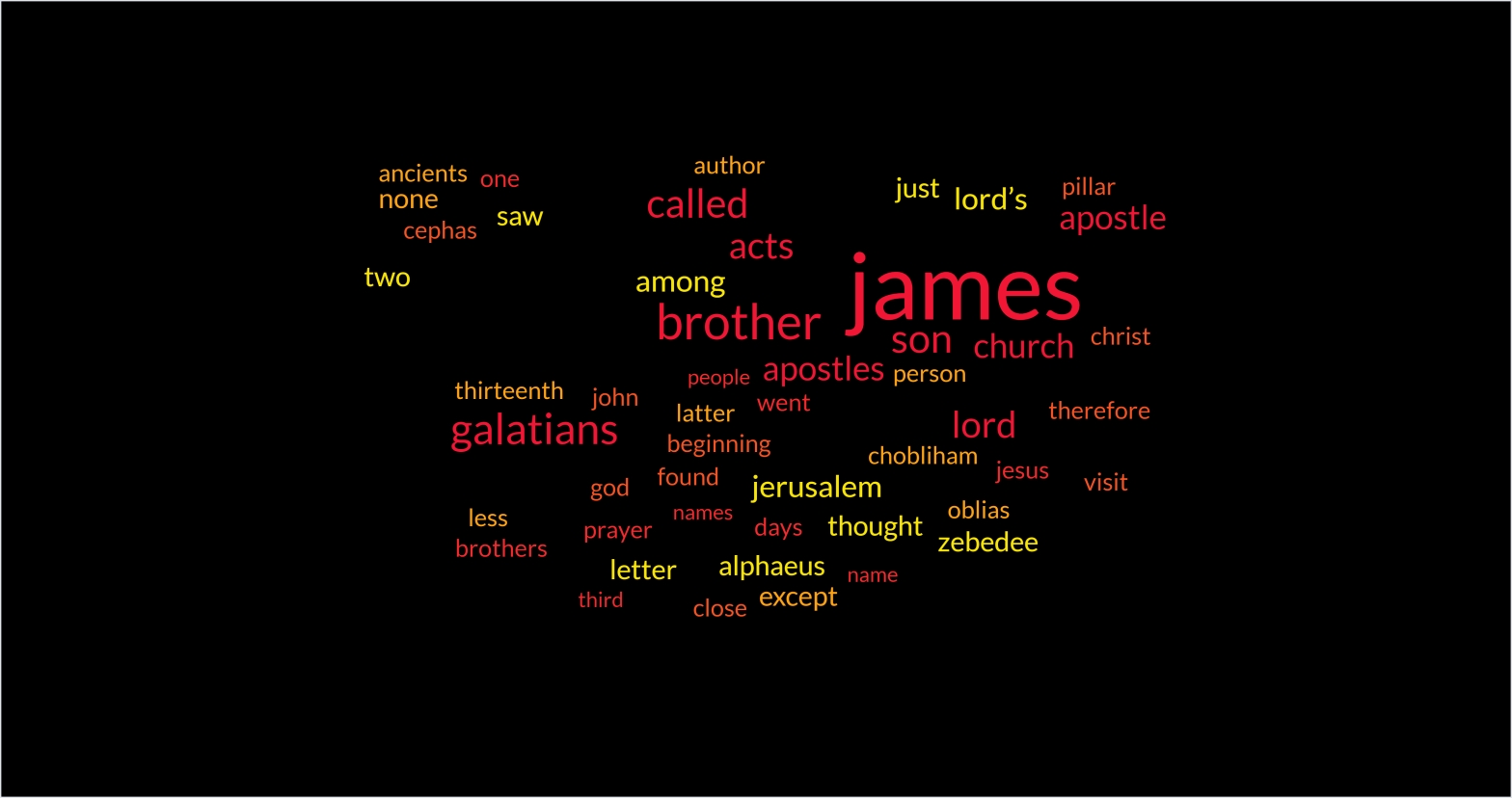James, the slave?
The word servant is sometimes used to imply an abject and vile condition, as that of a slave; thus the apostle Paul says, “neither … slave nor free … for you are all one in Christ Jesus” (Galatians 3:28); for “slave” he uses the word James uses for servant.
There is neither Jew nor Greek, there is neither slave nor free, there is no male and female, for you are all one in Christ Jesus.
(Galatians 3:28, ESV)
This great apostle, James, thinks it an honor to be the servant of God. The lowest ministry and office for God is honorable.
But why not “apostle”?
James was well known
He does not mention his apostleship, first, because there was no need, as he was eminent in the opinion and reputation of the churches; therefore Paul says he was reputed to be a pillar of the Christian faith (Galatians 2:9). Paul, whose apostleship was openly questioned, often asserted it.
and when James and Cephas and John, who seemed to be pillars, perceived the grace that was given to me, they gave the right hand of fellowship to Barnabas and me, that we should go to the Gentiles and they to the circumcised.
(Galatians 2:9, ESV)
An apostle doesn’t need to mention his apostleship in every letter
Secondly, Paul himself does not call himself an apostle in every letter.
Sometimes his style is, “Paul, a prisoner of Christ Jesus” (Philemon 1); sometimes “Paul and Timothy, servants of Christ Jesus” (Philippians 1:1); sometimes nothing but his name Paul is prefixed, as in 1 Thessalonians 1:1 and 2 Thessalonians 1:1.
Paul, a prisoner for Christ Jesus, and Timothy our brother, To Philemon our beloved fellow worker
(Philemon 1, ESV)
Paul and Timothy, servants of Christ Jesus, To all the saints in Christ Jesus who are at Philippi, with the overseers and deacons:
(Philippians 1:1, ESV)
Paul, Silvanus, and Timothy, To the church of the Thessalonians in God the Father and the Lord Jesus Christ: Grace to you and peace.
(1 Thessalonians 1:1, ESV)
Paul, Silvanus, and Timothy, To the church of the Thessalonians in God our Father and the Lord Jesus Christ:
(2 Thessalonians 1:1, ESV)
James 1:1 – “And of the Lord Jesus Christ.”
Some people take both these clauses to apply to the same person and read it thus: “A servant of Jesus Christ who is God and Lord”; indeed this was one of the verses that the Greek fathers used when arguing, against the Arians, for the Godhead of Christ.
But our reading, which separates the clauses, is to be preferred as less forced and more suitable to the apostolic inscriptions.
Christ and the Father are one
Neither is the dignity of Christ impaired hereby, as he is the object of equal honor with the Father; as the Father is Lord, as well as Jesus Christ, so Jesus Christ is God, as well as the Father.
Christ commissioned James
Well, then, James is not only God’s servant by the right of creation and providence, but Christ’s servant by the right of redemption; yes, especially appointed by Christ as Lord—that is, as mediator and head of the church—to do him service as an apostle.
Serving Christ is serving God
I suppose there is some special reason for this distinction, a servant of God and of … Christ, to show his countrymen that in serving Christ he served the God of his fathers, as Paul pleaded in Acts 26:6-7.
And now I stand here on trial because of my hope in the promise made by God to our fathers, to which our twelve tribes hope to attain, as they earnestly worship night and day.
And for this hope I am accused by Jews, O king!
(Acts 26:6–7, ESV)
Spiritual relationship with Christ better than physical
So James, the Lord’s kinsman, calls himself the Lord’s servant.
Note that inward privileges are the best and most honorable, and spiritual relationship is preferred to physical.
Mary was happier having Christ in her heart than in her womb, and James in being Christ’s servant rather than his brother.
Christ himself speaks about this in Matthew 12:47-50.
But he replied to the man who told him, “Who is my mother, and who are my brothers?”
And stretching out his hand toward his disciples, he said, “Here are my mother and my brothers!
For whoever does the will of my Father in heaven is my brother and sister and mother.”
(Matthew 12:47–50, ESV)
The truest relationship to Christ is founded on grace, and we are far happier receiving him by faith than touching him by blood.
Whoever endeavors to do his will may be as sure of Christ’s love and esteem as if he were linked to him by the closest outward relationship.
No dishonor for the highest to be Christ’s servant
It is no dishonor for the highest to be Christ’s servant.
James, whom Paul calls “a pillar”, calls himself a servant of … Christ; and David, a king, says, “I would rather be a doorkeeper in the house of my God than dwell in the tents of the wicked” (Psalm 84:10).
For a day in your courts
is better than a thousand elsewhere.I would rather be a doorkeeper in the house of my God
(Psalm 84:10, ESV)
than dwell in the tents of wickedness.
Idolatrous Levites punished to be doorkeepers
The office of the Nethinim, or doorkeepers in the temple, was the lowest; and therefore when the question was proposed what they should do with the Levites who had moved away from God to idols, God says, “They must bear the shame”; that is, they shall be degraded and employed in the lowest offices and ministries of the temple, as porters and doorkeepers (see Ezekiel 44:1013).
But the Levites who went far from me, going astray from me after their idols when Israel went astray, shall bear their punishment.
They shall be ministers in my sanctuary, having oversight at the gates of the temple and ministering in the temple.
They shall slaughter the burnt offering and the sacrifice for the people, and they shall stand before the people, to minister to them.
Because they ministered to them before their idols and became a stumbling block of iniquity to the house of Israel, therefore I have sworn concerning them, declares the Lord God, and they shall bear their punishment.
They shall not come near to me, to serve me as priest, nor come near any of my holy things and the things that are most holy, but they shall bear their shame and the abominations that they have committed.
(Ezekiel 44:10–13, ESV)
Yet David says, “I would rather be a doorkeeper”; human honor and greatness is nothing compared with this.
Paul found honor in lowliness
Paul was “a Hebrew of Hebrews” (Philippians 3:5)—that is, from an ancient Hebrew race and extraction, there being, to the memory of man, no proselyte in his family or among his ancestors, which was seen as a very great honor by that nation.
circumcised on the eighth day, of the people of Israel, of the tribe of Benjamin, a Hebrew of Hebrews; as to the law, a Pharisee;
(Philippians 3:5, ESV)
Yet Paul says he counts everything dung and dogs’ meat in comparison with an interest in Christ Jesus (see Philippians 3:8).
Indeed, I count everything as loss because of the surpassing worth of knowing Christ Jesus my Lord.
For his sake I have suffered the loss of all things and count them as rubbish, in order that I may gain Christ
(Philippians 3:8, ESV)
The highest in the Church are only servants
The highest ranks in the church are still only servants: James, a servant. See 2 Corinthians 4:1.
“Therefore, having this ministry by the mercy of God, we do not lose heart.”
(2 Corinthians 4:1, ESV)
The sin of Corinth was man-worship, giving excessive honor and respect to those teachers whom they admired, setting them up as heads of factions and giving up their faith to their dictates.
The apostle seeks to reclaim them from that error, by showing that they are not masters but ministers: give them the honor of a minister and steward, but not that dependence which is due only to the Master. See 2 Corinthians 1:24.
Not that we lord it over your faith, but we work with you for your joy, for you stand firm in your faith.
(2 Corinthians 1:24, ESV)
We are not to prescribe articles of faith but explain them.
Ministers are not to be masters of our consciences
So the apostle Peter bids the elders not to lord it over God’s heritage (see 1 Peter 5:3), not to have mastery over their consciences.
not domineering over those in your charge, but being examples to the flock.
(1 Peter 5:3, ESV)
Our work is mere service, and we can but persuade; Christ must impose himself upon the conscience.
Matthew 23:10 – “Neither be called instructors”
This is Christ’s own advice to his disciples in Matthew 23:10: “Nor are you to be called ‘teacher,’ for you have one Teacher, the Christ.”
Neither be called instructors, for you have one instructor, the Christ.
(Matthew 23:10, ESV)
All the authority and success of our teaching is from our Lord.
We can prescribe nothing as necessary to be believed or done that is not according to his will or word.
In short, we come not in our own name and must not act with respect to our own ends; we are servants.
Honor the Father and the Son
In everything we do we must honor the Father, and also the Son: “all may honor the Son just as they honor the Father” (John 5:23); that is, God will be honored and worshiped only in Christ.
…that all may honor the Son, just as they honor the Father.
Whoever does not honor the Son does not honor the Father who sent him.
(John 5:23, ESV)
“Trust in God; trust also in me” (John 14:1).
Let not your hearts be troubled.
Believe in God; believe also in me.
(John 14:1, ESV)
Believing is the highest worship and respect of the creature; you must give it to the Son, to the second person as mediator, as well as to the Father.
Look for the acceptance of your work in Christ
Do duties so as to honor Christ in them; and so:
First, look for their acceptance in Christ.
It would be sad if we were only to look to God the Father in our work.
Adam hid himself and did not dare to come into God’s presence until the promise of Christ.
The hypocrites cried, “Who of us can dwell with the consuming fire?” (Isaiah 33:14).
The sinners in Zion are afraid;
trembling has seized the godless:“Who among us can dwell with the consuming fire?
(Isaiah 33:14, ESV)
Who among us can dwell with everlasting burnings?”
Guilt can form no other thought about God when looking upon him apart from Christ; we can see nothing but majesty armed with wrath and power.
But now it is said that “in him we may approach God with freedom and confidence” (Ephesians 3:12); for in Christ those attributes that are in themselves terrible become sweet and comforting, just as water, which is salt in the ocean, once strained through the earth, becomes sweet in the rivers.
in [Christ] we have boldness and access with confidence through our faith in him.
(Ephesians 3:12, ESV)
Look for your assistance from Christ
Second, look for your assistance from him. You serve God in Christ:
a. When you serve God through Christ: “I can do everything through him who gives me strength” (Philippians 4:13).
I can do all things through him who strengthens me.
(Philippians 4:13, ESV)
When your own hands are in God’s work, your eyes must look to Christ’s hands for support in it: see Psalm 123:2; you must go about God’s work with his own tools.
Behold, as the eyes of servants look to the hand of their master,
as the eyes of a maidservant to the hand of her mistress,so our eyes look to the Lord our God,
(Psalm 123:2, ESV)
till he has mercy upon us.
Have an eye for the concerns of Jesus Christ in all your service of God
b. When you have an eye for the concerns of Jesus Christ—in all your service of God (2 Corinthians 5:15).
and he died for all, that those who live might no longer live for themselves but for him who for their sake died and was raised.
(2 Corinthians 5:15, ESV)
We must “live … for him who died for [us]”; not only for God in general, but for him, for God who died for us.
You must see how you advance his kingdom, propagate his truth, further the glory of Christ as mediator.
Do all for Christ’s sake
c. When all is done for Christ’s sake.
In Christ God has a new claim on you, and you are bought with his blood, that you may be his servants.
Under the law the great argument for obedience was God’s sovereignty: do so-and-so, “I am the Lord”— as in Leviticus 19:37.
And you shall observe all my statutes and all my rules, and do them:
I am the Lord.
(Leviticus 19:37, ESV)
Now the argument is gratitude, God’s love in Christ: “For Christ’s love compels us” (2 Corinthians 5:14).
For the love of Christ controls us, because we have concluded this: that one has died for all, therefore all have died;
(2 Corinthians 5:14, ESV)
The apostle often persuades with that motive: be God’s servants for Christ’s sake.








